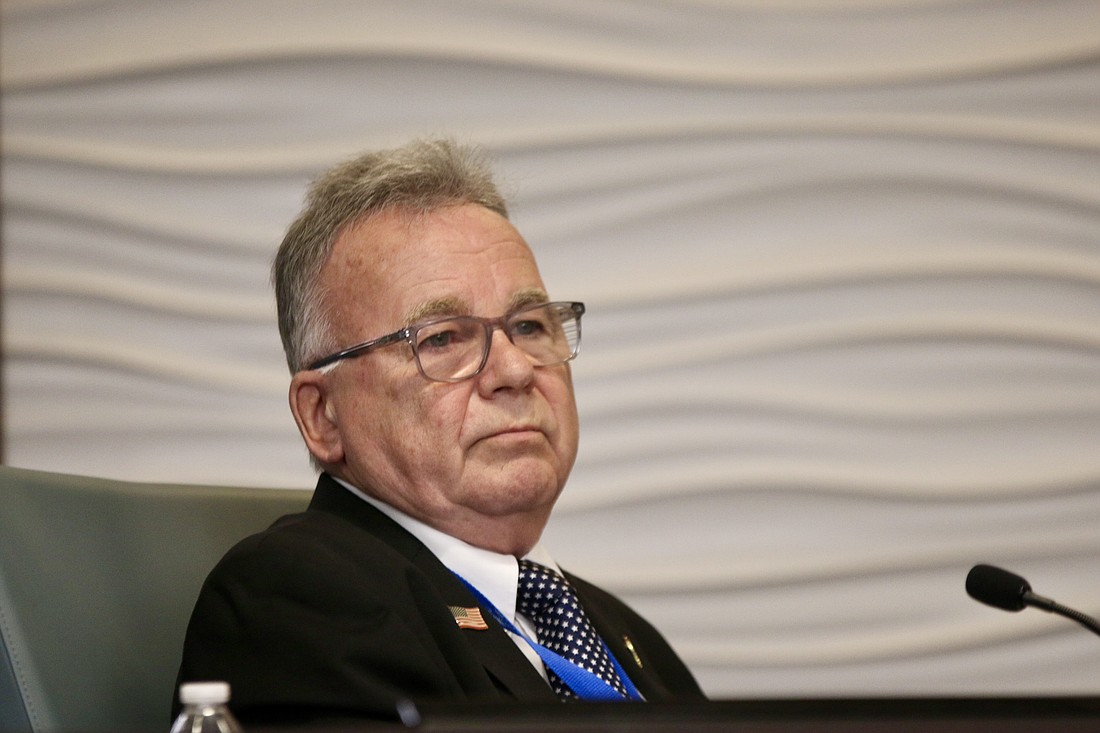- April 25, 2024
-
-
Loading

Loading

Palm Coast’s City Council will not add an invocation to its opening remarks. Instead, the existing moment of silence has been extended to a minute, the length of time the council had discussed using for an invocation.
Mayor David Alfin had said previously that he would insist on a unanimous consensus to add an invocation, because of the issue’s divisiveness. But the proposed invocation resolution didn't even come to a vote at the April 4 meeting.
When Vice Mayor Ed Danko motioned to approve the resolution, none of the other members seconded his motion, and the motion failed for lack of a second — to the vocal disappointment of Danko and the pro-prayer members of the public present at the meeting.
"The Supreme Court has already ruled this is legal," Danko said. "We're not reinventing the wheel here."
The Supreme Court has already ruled this is legal. ... We're not reinventing the wheel here. — Ed Danko, Vice Mayor
After the resolution failed, council member Theresa Carli Pontieri motioned that the moment of silence be set to a minute-long time frame in lieu of the invocation “to allow people to — if they want to engage in a more meaningful prayer — to give them more time," Pontieri said.
She said she agreed with one public commenter who said a handful of seconds was not enough.
That motion passed 4-1, with Danko dissenting.
Alfin and council members Pontieri, Cathy Heighter and Nick Klufas all decided against the invocation, saying the moment of silence was enough for personal prayer and reflection.
Pontieri said she used the moment of silence to pray and that it is her way of abiding by God's directive "to pray to my father unseen."
"In this way, I'm following the teachings in my faith without also imposing my religion or faith on others," Pontieri said.
Klufas pointed out to attendees that nothing was stopping them from using the public comment section of the meetings to read their own three-minute invocation.
"Anyone is allowed to give [a prayer] — you can come here and do an invocation yourself every single Tuesday," he said.
Anyone is allowed to give [a prayer] — you can come here and do an invocation yourself every single Tuesday. — Nick Klufas, Council member
Klufas said he had even heard from local religious leaders who felt the resolution would "open up a whole can of worms that we can't accurately predict."
During the April 4 meeting's regular opening moment of silence, many members of the public recited the Lord's Prayer, with four of the five council members seating themselves once the moment of silence was over and Danko remaining standing until the end of the prayer.
Palm Coast resident Frank Ehrhart said prayer was tied with the nation's history, going back to the Founding Fathers.
"As far as I'm concerned, there's nothing in the Constitution that says there's a separation of church and state," Ehrhart said.
Danko was the one to initially suggest the invocation during a Feb. 1 workshop.
The Constitution prohibits discriminating against or excluding any religion from an invocation, and case law even says a secular invocation is allowed, City Attorney Neysa Borkert said.
But almost every pro-invocation speaker during the meeting’s public comment period spoke in support of opening council meetings with a Judeo-Christian prayer. Many even read scriptures from the Bible to make their points.
Borkert reminded the City Council — and the public — that opening the door to an invocation would mean allowing invocations of all kinds — Muslim, Hindu, Wiccan and more.
Palm Coast resident Charles Hanger said he would be happy to add prayer to the City Council meetings, but asked residents to consider if they were as adamant privately as they were in public.
"This is not the venue for religious challenges," Hanger said. "For 15 or 20 seconds, right here [during the moment of silence], I had the opportunity of being alone with my Lord and savior."
Rabbi Merrill Shapiro, past president of the board of trustees of Americans United for Separation of Church and State, spoke against a public invocation, instead urging the City Council to abide by the words of Jesus by praying in private.
"Hear the words of Jesus of Nazareth," Shapiro said, "who — in chapter six of Matthew, verse six — says, 'When you pray, go into your room. Close the door and pray to your Father who is unseen.'"
Shapiro told the Observer that the invocation proposal would disenfranchise some religious community members, not to mention cutting out agnostics, atheists and others.
Hear the words of Jesus of Nazareth, who — in chapter six of Matthew verse six —says, 'when you pray go into your room. Close the door and pray to your Father who is unseen.' — Rabbi Merrill Shapiro
Quakers, he said, believe everyone is equal and do not have religious leaders like clergy. Flagler County also has a Muslim community that worships in Daytona Beach, Shapiro said, meaning their religious leaders would not be able to read an invocation in Palm Coast.
"Different groups don't have leaders, per se. ... [An invocation] would divide us into believers, nonbelievers," Shapiro said. "There already is a division."
Pontieri said she had heard from many residents — both for and against the invocation — leading up to the meeting. She agreed with their feelings that God needed to be brought back into government, but she felt an invocation was not the right way.
"That doesn't mean that my choice to have a moment of silence over prayer is excluding God," she said. "It's not my job to preach when I'm here. It's my job to prophesize through my actions and my words and my kindness and respect to others."